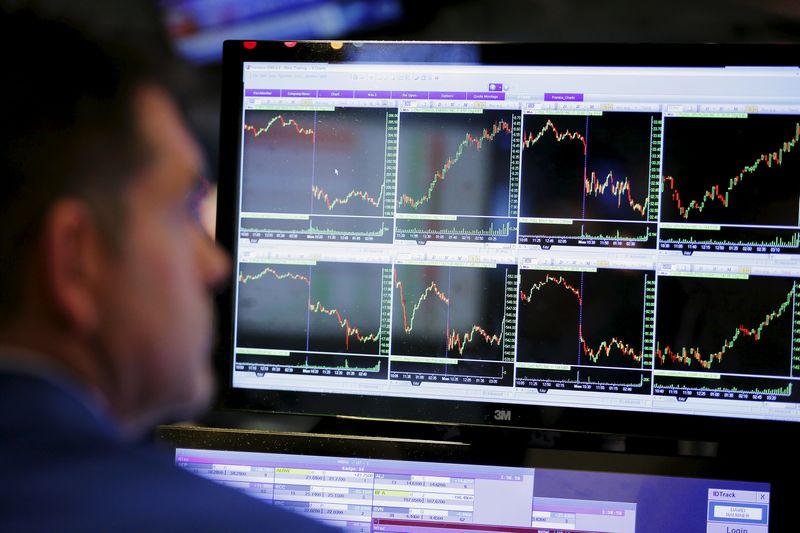By Geoffrey Smith
Investing.com -- The European Central Bank may announce its biggest ever interest rate hike in an effort to prop up the ailing euro. Federal Reserve chair Jerome Powell will speak at a Washington conference, while the U.S. will also release weekly jobless claims. Naspers prepares to unload a bunch of Tencent stock in the latest big cashing-out from Chinese equities, and oil prices stabilize after slumping to six-month lows on Wednesday, but face another test from U.S. inventories data. Here's what you need to know in financial markets on Thursday, September 8.
1. Powell to speak as dollar pressures Asian currencies again
Federal Reserve Chair Jerome Powell will speak at 09:10 ET (13:10 GMT) at a conference organized by the Cato Institute. That’s against a backdrop of data suggesting that the economy is, after all, holding up better than it seemed earlier this summer - something that analysts fear will embolden it to keep raising interest rates aggressively.
Expectations for U.S. rates continue to propel the dollar higher, with the Korean won posting another multi-year low in overnight trading, while the yen found some support after more intense jawboning from the Japanese government.
One of the data series that has provided the strongest proof of the economy’s robustness is weekly jobless claims, which have trended gently lower over the last month. Data for last week are due at 08:30 ET and initial claims are expected to show a modest increase to 240,000 from 232,000.
2. ECB set for biggest ever rate hike
One currency that may have found at least a short-term bottom against the dollar is the euro. It rose 0.1% in morning trading in Europe to trade back above parity against the dollar, on expectations that the European Central Bank will announce its biggest ever interest rate hike at 08:15 ET.
Short-term interest rate futures suggest that the market is split between expecting a raise of 50 or 75 basis points, with the balance slightly in favor of 75. The amount of support the euro gets from the announcement may depend heavily on the skill with which President Christine Lagarde communicates the bank’s thinking at her press conference at 08:45 ET.
Also supporting the euro is a sense that the worst of the newsflow surrounding the energy crisis may be over: benchmark gas prices extended their big falls on Wednesday which followed the announcement of measures intended to depress peak power consumption and put effective price caps both on wholesale power prices and the price of Russian gas imports.
3. Stocks mark time ahead of central banks; Tencent in focus
U.S. stock markets are set to open flat after a solid bounce on Wednesday in response to the sharp fall in oil prices (see below) and growing confidence that the Fed can engineer a soft landing for the economy.
By 06:20 ET, Dow Jones futures were down a mere 9 points, less than 0.1%, while S&P 500 futures and Nasdaq 100 futures were also effectively unchanged. The three benchmark cash indices had gained by between 1.4% and 2.1% on Wednesday.
Stocks likely to be in focus later include Tesla (NASDAQ:TSLA), after reports of near-record deliveries from its China plant in August, suggesting that an upgrade to the plant’s production processes went well. Also in focus will be GameStop (NYSE:GME), which is up nearly 10% in premarket after reporting a smaller-than-expected loss and a new partnership with crypto exchange FTX.
One stock under pressure is Tencent (HK:0700). Prosus (AS:PRX), the holding company that owns Naspers' (JO:NPNJn) stake in the multiplatform company, is set to unload a stake of some 7.6%, the latest in a series of deals which have seen western backers partially cash out of long-term holdings of Chinese equities.
Zscaler (NASDAQ:ZS) reports earnings after the close.
4. A first look at Trussonomics
The U.K.’s new Prime Minister Liz Truss will give details of her package to tackle the U.K.’s energy crisis, the first major test of her premiership.
Reports sourced to people close to her economic team have suggested that the scheme may require up to 100 billion pounds in fresh borrowing. That’s put pressure on both the pound, which fell to its lowest since 1985 overnight, and on U.K. government bond yields.
The rise in yields is particularly troubling as a rise in debt servicing costs would rapidly restrict Truss’s room for any sort of fiscal stimulus. In related news, the Bank of England – whose independence Truss questioned during her campaign in the recent Conservative Party leadership contest – is set to become the first major central bank to actively sell bonds from its QE portfolio later this month, adding to the upward pressure on yields.
5. Oil stable after Wednesday slump; EIA inventories due
Crude oil prices stabilized after slumping to six-month lows on Wednesday, on suggestions that India – one of the world’s biggest importers – may sign up to the G-7’s proposal to put a cap on the price of Russian oil exports.
India has traditionally been politically close to Russia, having a long history as a buyer of Russian and, previously, Soviet arms. However, it also faces the same balance of payments and inflation problems as any other energy importer, so its interests do partially overlap with those of the U.S. and Europe.
Also weighing on prices on Wednesday was a surprise 3.4 million barrel increase in U.S. crude stocks, according to the American Petroleum Institute. The government’s official data are due at 10:30 ET, and may put fresh pressure on prices if they corroborate the API’s numbers.
